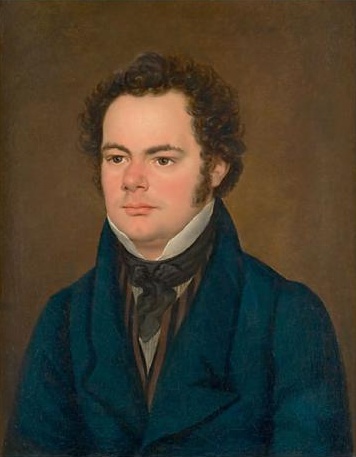Der Wanderer on:
[Wikipedia]
[Google]
[Amazon]
 "Der Wanderer" ( D 489) ormerly D 493is a
"Der Wanderer" ( D 489) ormerly D 493is a
Text
at
 "Der Wanderer" ( D 489) ormerly D 493is a
"Der Wanderer" ( D 489) ormerly D 493is a lied
In the Western classical music tradition, ( , ; , ; ) is a term for setting poetry to classical music. The term is used for any kind of song in contemporary German and Dutch, but among English and French speakers, is often used interchangea ...
composed by Franz Schubert
Franz Peter Schubert (; ; 31 January 179719 November 1828) was an Austrian composer of the late Classical period (music), Classical and early Romantic music, Romantic eras. Despite his short life, Schubert left behind a List of compositions ...
in October 1816 for voice and piano. A revised version was published near the end of May 1821 as opus 4, number 1. The words are taken from a German poem by Georg Philipp Schmidt (von Lübeck). The lied is set in the key of C-sharp minor
C-sharp minor is a minor scale based on C, with the pitches C, D, E, F, G, A, and B. Its key signature consists of four sharps.
The C-sharp natural minor scale is:
Changes needed for the melodic and harmonic versions of the scale ar ...
with the tempo
In musical terminology, tempo (Italian for 'time'; plural 'tempos', or from the Italian plural), measured in beats per minute, is the speed or pace of a given musical composition, composition, and is often also an indication of the composition ...
marking ''sehr langsam'' (very slow) and the time signature alla breve. The piece has a total of 72 measures. Schubert wrote another lied entitled "Der Wanderer;" it is numbered D.649.
Detailed description of ''Der Wanderer''
The song begins with arecitative
Recitative (, also known by its Italian name recitativo () is a style of delivery (much used in operas, oratorios, and cantatas) in which a singer is allowed to adopt the rhythms and delivery of ordinary speech. Recitative does not repeat lines ...
, describing the setting: mountains, a steaming valley, the roaring sea. The wanderer is strolling quietly, unhappily, and asks, sighing, the question: "where?"
The next section, consisting of 8 bars of a slow melody sung in pianissimo
In music, the dynamics of a piece are the variation in loudness between note (music), notes or phrase (music), phrases. Dynamics are indicated by specific musical notation, often in some detail. However, dynamics markings require interpretation ...
, describes the feelings of the wanderer: the sun seems cold, the blossom withered, life old. The wanderer expresses the conviction of being a stranger everywhere. This 8-bar section was later used by Schubert as theme on which his Wanderer Fantasy
The Fantasie in C major, Op. 15 ( D. 760), popularly known as the ''Wanderer Fantasy'', is a four-movement fantasy for solo piano composed by Franz Schubert in 1822. It is widely considered Schubert's most technically demanding composition for th ...
is based.
Next the music shifts to the key of E major
E major is a major scale based on E, consisting of the pitches E, F, G, A, B, C, and D. Its key signature has four sharps. Its relative minor is C-sharp minor and its parallel minor is E minor. Its enharmonic equivalent, F-flat maj ...
, the tempo increases and the time signature changes to 6/8. The wanderer asks: "where are you my beloved land?" This place the wanderer longs for is described as green with hope, "the land where my roses bloom, my friends stroll, my dead rise" and, finally, "the land which speaks my language, Oh land, where are you?" Towards the end of this section, the music gets quite animated and forms the climax of the song.
Finally, the music returns to the original minor key and slow tempo. After quoting the question "where?" from the opening, the song closes with a "ghostly breath" finally answering the question: "There where you are not, there is happiness." The song closes in the key of E major.
Song lyrics
Ich komme vom Gebirge her, Es dampft das Tal, es braust das Meer. Ich wandle still, bin wenig froh, Und immer fragt der Seufzer, wo? Die Sonne dünkt mich hier so kalt, Die Blüte welk, das Leben alt, Und was sie reden, leerer Schall; Ich bin ein Fremdling überall. Wo bist du, mein geliebtes Land? Gesucht, geahnt, und nie gekannt! Das Land, das Land so hoffnungsgrün, Das Land, wo meine Rosen blühn. Wo meine Träume wandeln gehn, Wo meine Toten auferstehn, Das Land, das meine Sprache spricht, O Land, wo bist du? . . . Ich wandle still, bin wenig froh, Und immer fragt der Seufzer, wo? Im Geisterhauch tönt's mir zurück: "Dort, wo du nicht bist, dort ist das Glück."References
External links
*Text
at
The LiederNet Archive
The LiederNet Archive (formerly The Lied, Art Song, and Choral Texts Archive) is a donation-supported web archive of art song and choral texts founded in 1995 by Emily Ezust, an American/Canadian computer programmer and amateur violinist. The webs ...
{{DEFAULTSORT:Wanderer, Der
1816 songs
Lieder composed by Franz Schubert